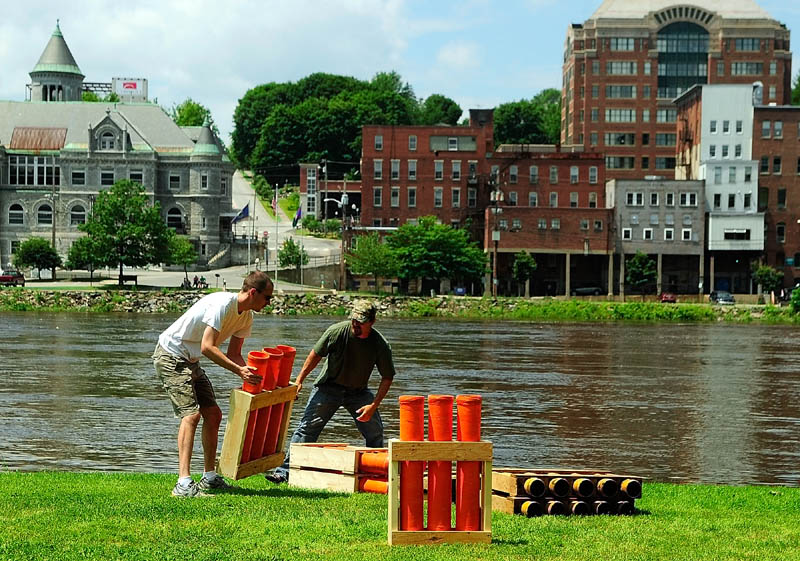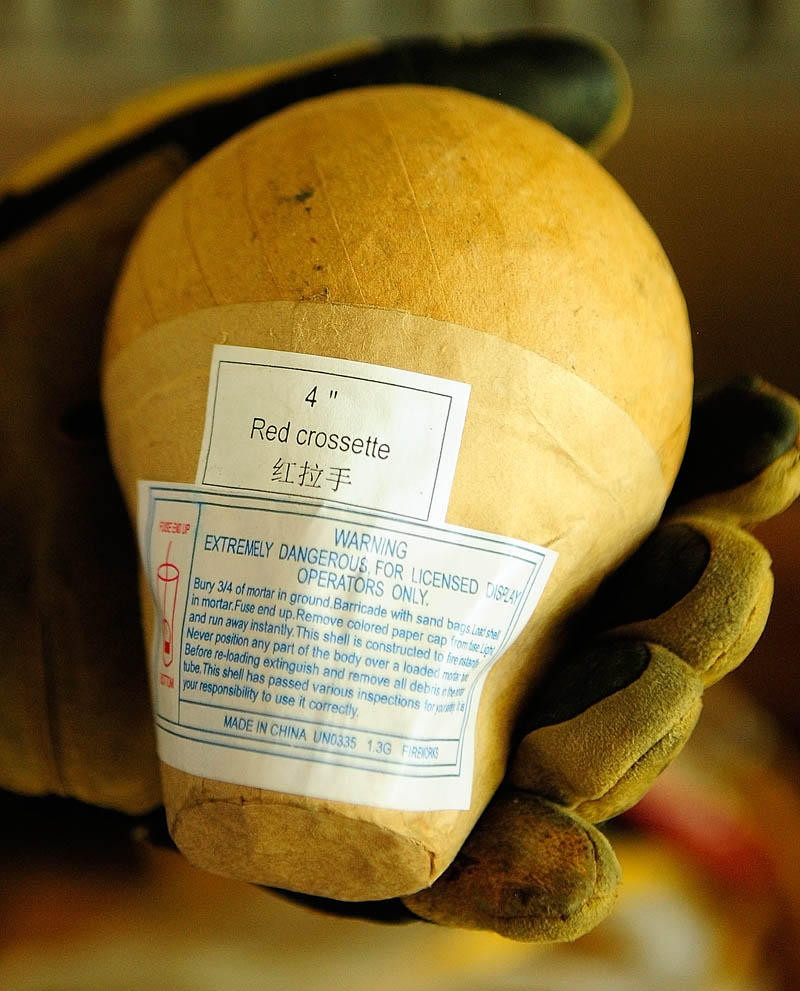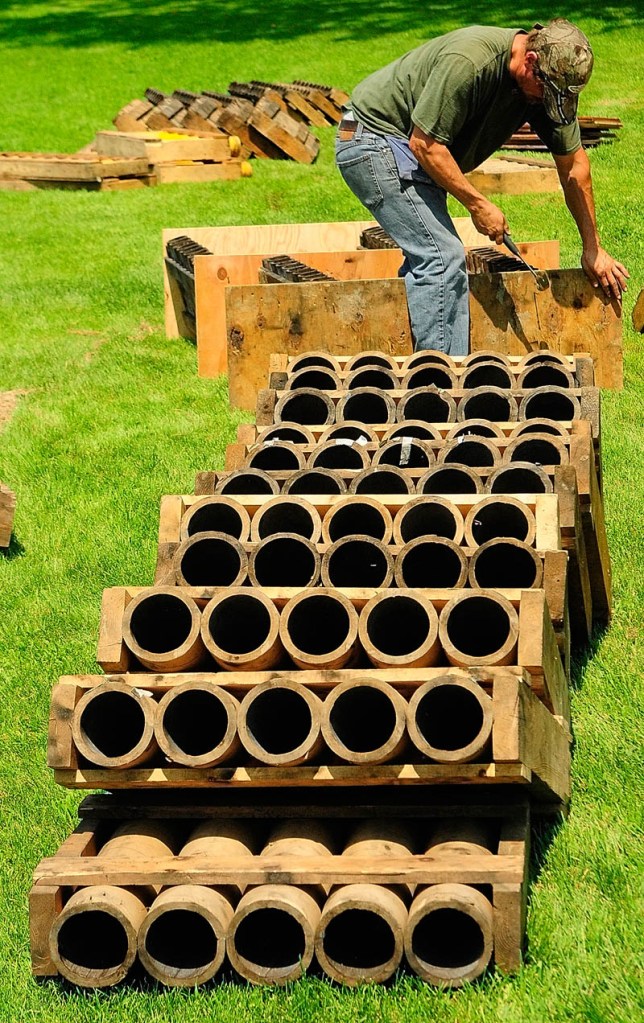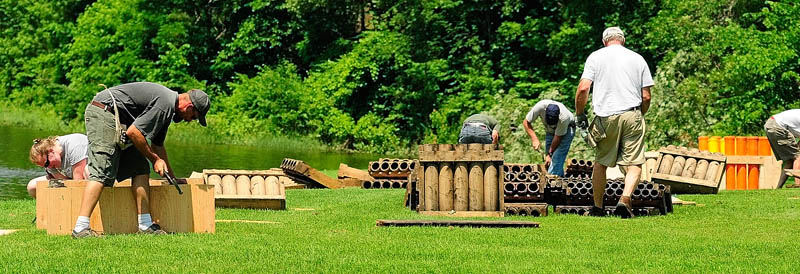AUGUSTA — As you were taking in a parade and spending time with your family Thursday, Charlie Squires and his Central Maine Pyrotechnics crew labored in the scorching heat and humidity to unload a 20-foot box truck filled with launching racks, shells and plywood.
On Thursday night, after thousands of people oohed and aahed at the city’s Fourth of July fireworks show, Squires and his crew was expecting to spend hours tearing all the gear down and delivering it back to the company’s headquarters in Hallowell.
And for Squires, the 14-plus-hour day will all be worth it for the 20 minutes of enjoyment and the applause he always hears at the end.
“It’s an enjoyable experience,” he said. “When you figure your responsible for giving 8- to 10,000 people 20 minutes of joy, it’s a good thing.”
Squires, 59, has been a fireworks technician for Central Maine Pyrotechnics for about 25 years. A retired Augusta firefighter, Squires has handled the city’s Fourth of July shows for years.
Thursday’s program included more than 1,100 shells, all between 2.5 and 5 inches in diameter.
Nearly half of those shells, or 520, were to be ignited during the finale, Squires said. He said Central Maine Pyrotechnics offers up a 10-inch shell, but most shows average 6 inches or less.
“One 8-inch shell is equal to a whole lot of little shells,” Squires said. “If you want a good show, you need numbers.”
Squires and his crew of five, comprised of family and friends, many of whom have helped him set up for years, arrived at the East Side Boat Landing at noon to begin setting up for the 9:15 p.m. show.
The first obstacle is clearing the area of people and blocking it off with yellow tape. State regulations require a launch site with a 350-foot “hot zone” that is free of people, overhangs, buildings and flammable material.
“This site is tricky,” Squires said. “The bigger the shell, the greater the (setback) distance.”
The safety zone is necessary to reduce the likelihood of damaging a building or injuring a person, but injuries can still occur. Squires, who was working in Augusta, and Thomas Thorndike, another Central Maine Pyrotechnics technician who was putting on a Belgrade show, were injured when shells exploded uncharacteristically during Fourth of July shows in 2010. Squires suffered a broken finger; Thorndike, first-degree burns on his face.
“It was the first time I’d been hurt,” Squires said.
The State Fire Marshal’s Office invested both and determined the incidents were just accidents. Both operators had followed proper procedure.
“They aren’t 100 percent predictable,” Squires said. “They have been known to do things you don’t plan on them doing.”
After clearing the park of people, Squires and his crew got to work setting up for the show. They unloaded several boxes of shells, and then the crew starting sorting launching racks according to size and placement in the program. The racks look similar to wooden pallets, but they are custom-built to hold a row of several launching tubes securely. The tubes themselves are fiberglass and resemble polyvinyl chloride plastic in look and feel. Sections of plywood, each about 4 feet long and a couple of feet wide, are nailed to the racks to hold the launch tubes at an angle to shoot the ordnance out over the Kennebec River.
The racks were placed in a line along the river’s edge, with the opening barrage on one end and the finale on the other. The opening sequence and the finale are ignited by a single fuse; but for much of the show, Squires lights each shell individually.
“You have to pay attention and be aware of what is going on around you,” Squires said. “I haven’t seen a show in 25 years.”
That may change next year. Squires and his wife, who will retire soon, have agreed that this will be the last year he’s in charge of a Fourth of July show. He hopes to turn the job over to his son-in-law, Chris DeLisle, who has worked with Squires for about 16 years.
“We want to do a little bit of traveling,” Squires said of his wife. “She really worries, especially since I got blown up a few years ago.”
Craig Crosby — 621-5642
ccrosby@mainetoday.com
Send questions/comments to the editors.






Success. Please wait for the page to reload. If the page does not reload within 5 seconds, please refresh the page.
Enter your email and password to access comments.
Hi, to comment on stories you must . This profile is in addition to your subscription and website login.
Already have a commenting profile? .
Invalid username/password.
Please check your email to confirm and complete your registration.
Only subscribers are eligible to post comments. Please subscribe or login first for digital access. Here’s why.
Use the form below to reset your password. When you've submitted your account email, we will send an email with a reset code.